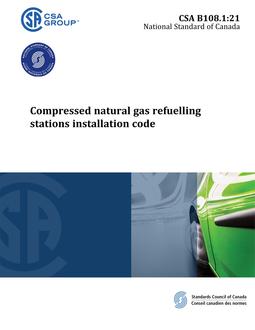Click here to purchase
Preface:
This is the first edition of CSA B108.1, Compressed natural gas refuelling stations installation code. It supersedes the previous editions published in 2018 as Part 1 of CSA B108, Natural gas refuelling stations installation code, and in 2014, 1999, and 1995 as CSA B108, Compressed natural gas fuelling stations installation code.
CSA B108.1 is applicable to compressed natural gas (CNG) refuelling stations. CSA B108.2 is applicable to liquefied natural gas (LNG) refuelling stations, including LNG to CNG conversion systems. CSA B108.2 supersedes Annex D of CSA Z276, Liquefied natural gas (LN) — Production, storage, and handling.
Significant changes to this edition include the following:
a) reorganized content for consistency of organization between this Code and CSA B108.2;
b) clarification of definitions, and requirements to include distinction between residential fuelling appliances (RFAs) and listed non-residential vehicle fuelling appliances (VFAs);
c) added coverage for defuelling;
d) added coverage for mobile refuelling units and portable refuelling units;
e) added reference content for Risk assessment;
f) added coverage for CNG stations where feedstock is liquefied natural gas (L/CNG refuelling stations); and
g) editorial revisions to clarify wording and references, tables and figures, resolve conflicts identified with other documents, provide consistency and clarification between this Code and CSA B108.2, correct metrication values, and harmonize definitions with other industry codes and standards.
CSA Group acknowledges that the development of this Code was made possible, in part, by the financial support of Natural Resources Canada.
This Code was prepared by the Subcommittee on Natural Gas for Vehicle Refuelling Stations Installation Code, under the jurisdiction of the Technical Committee on Natural Gas Transportation and the Strategic Steering Committee on Transportation, and has been formally approved by the Technical Committee and the Interprovincial/Territorial Gas Advisory Council.
This Code has been developed in compliance with Standards Council of Canada requirements for National Standards of Canada. It has been published as a National Standard of Canada by CSA Group.
Scope:
1.1 Inclusions
This Code applies to all compressed natural gas (CNG) refuelling stations, including those that are fixed or mobile and intended for private or public dispensing operations.
1.2 Exclusions
This Code does not apply to
a) refuelling vehicles with liquefied natural gas (LNG). Refuelling vehicles with LNG is addressed in CSA B108.2. However, when an LNG facility has capacity for CNG vehicle refuelling, this Code applies to facilities downstream of the L/CNG odorize’s outlet isolation valve;
b) transfer of CNG from the CNG vehicle fuel storage system of one vehicle to the CNG vehicle fuel storage system of another vehicle. This does not apply to a bulk container; and
c) listed residential fuelling appliances (RFAs) and listed non-residential vehicle fuelling appliances (VFAs), except where
i) the aggregate inlet flow capacity of a connected VFA or RFA, or a combination thereof, exceeds 0.850 Sm3/min (30 SCFM); or
ii) the VFA or RFA is connected to storage, in which case coverage applies to the storage and dispensing system starting at the outlet of the individual VFA or RFA (see Figure D.1).
1.3 Pressure terminology
All references to pressure throughout this Code are to be considered gauge pressures, unless otherwise specified.
1.4 Terminology
In this Code, “shall” is used to express a requirement, i.e., a provision that the user is obliged to satisfy in order to comply with the Code; “should” is used to express a recommendation or that which is advised but not required; and “may” is used to express an option or that which is permissible within the limits of the Code. Notes accompanying clauses do not include requirements or alternative requirements; the purpose of a note accompanying a clause is to separate from the text explanatory or informative material. Notes to tables and figures are considered part of the table or figure and may be written as requirements. Annexes are designated normative (mandatory) or informative (non-mandatory) to define their application.
1.5 Use of SI units
The values given in SI units are the units of record for the purposes of this Code. The values given in parentheses are for information and comparison only.
Notes:
1) IEEE/ASTM SI 10 or ISO 80000-1 can be used as a guide when converting imperial units to metric units.
2) Where the abbreviation “gal” is used in this Code, it indicates a U.S. gallon equivalent to 3.785 L water capacity.
3) This Code was developed originally using the imperial system of measurement and subsequently converted to metric units having three significant digits. Every attempt has been made to provide accurate conversion values; however, when designing systems using these values, engineering judgment needs to be applied.
Product Details
- Edition:
- 1st
- Published:
- 01/01/2021
- ISBN(s):
- 9781488332210
- Number of Pages:
- 68
- File Size:
- 1 file , 1 MB
- Product Code(s):
- 2428562, 2428562
